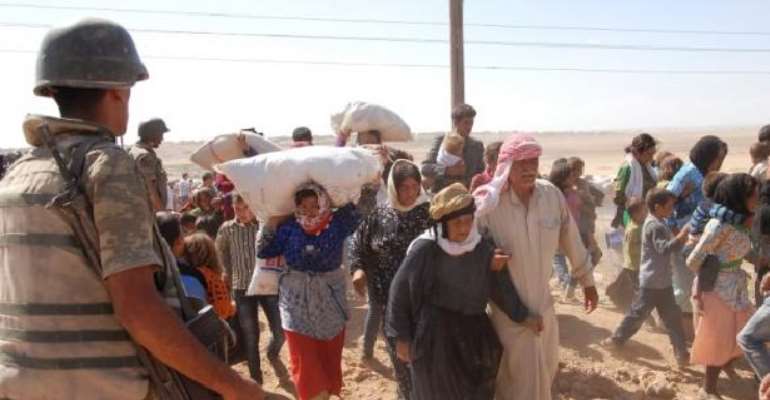Syrian Kurds Fleeing Islamic State Cross Border Into Turkey

Several thousand Syrian Kurds began crossing into Turkey on Friday fleeing Islamic State fighters who advanced into their villages, prompting warnings of massacres from Kurdish leaders.
Islamic State (IS) fighters have seized villages in northern Syria over the past two days and are besieging the mainly Kurdish town of Ayn al-Arab, known as Kobani in Kurdish, on the Turkish border.
Their advance comes as the United States draws up plans for military action in Syria against the Sunni Muslim extremist group which has seized swathes of territory in Syria and Iraq and seeks to set up an Islamic caliphate in the heart of the Middle East.
Turkey is already sheltering more than 1.3 million Syrian refugees and fears hundreds of thousands more, waiting in the mountains on the Syrian side of the 900-km (560-mile) border, could seek to cross as fighting escalates.
The Syrian Observatory for Human Rights, which tracks developments in the civil war, said on Friday IS had seized three more villages near Kobani, bringing to 24 the number it had taken.
The attack on Kobani prompted a Kurdish militant call to the youth of Turkey's mainly Kurdish southeast to join the fight against IS and came days after the U.S. military said the help of Syrian Kurds would be needed against the Islamist militants.
Turkish Prime Minister Ahmet Davutoglu, who has said the priority is to give aid on the Syrian side of the border, said he had given the order for the Syrians to be let in after receiving information that 4,000 had arrived seeking shelter.
“When our brothers from Syria and elsewhere arrive at our borders to escape death … without discrimination over religion or sect, we take them in and we will continue to take them in,” he told reporters during a trip to Azerbaijan.
Turkey is trying to persuade the United States of the need to create a “buffer zone” inside Syria, Turkish officials said, a safe haven on the border likely to require a foreign-patrolled no-fly zone where displaced civilians could be given aid.
“The establishment of a buffer zone is of great importance both for Turkey and for Syrians who have been uprooted,” a senior government official told Reuters, referring to an idea mooted this week by President Tayyip Erdogan.
Talks with U.S. officials were continuing, he said.
U.S. President Barack Obama said last week he would not hesitate to strike Islamic State, which has used Syria as a base to advance its plan to reshape the Middle East according to its radical vision of Sunni Islam.
BREAD, WATER
The United States is conducting air strikes against Islamic State in Iraq and last month Obama authorized surveillance flights over Syria.
Turkish soldiers armed with rifles initially formed a line along the border to maintain security, but allowed residents of the Turkish village of Dikmetas, 20 km (12 miles) along the frontier from Kobani, to fling bottles of water and bags of bread across a barbed wire barrier to the crowd of Syrian Kurds.
The soldiers later began escorting hundreds of mostly women and children, laden with possessions, into Turkey.
Machinegun fire and shelling could be heard from a few kilometers away and one woman brought across the border was hospitalized after stepping on a landmine.
Turkish security forces at one point fired tear gas and water cannon to disperse a group of about 100 people as they sought to cross into Syria on Friday in an apparent protest against the tight border security.
Turkey has maintained an open border with Syria throughout its conflict to allow refugees out and humanitarian aid in, but has tightened border security in recent months amid criticism that the policy enabled foreign jihadists to cross and swell the ranks of Islamic State militants.
The number of Kurds on the border shrank from about 3,000 on Thursday night, but more began arriving on foot on Friday.
“The weather was cold overnight so most went back to their villages. They started coming back to the border this morning,” said Halil, a man in his 40s on the Turkish side of the border.
Western states have expanded contact with the main Syrian Kurdish party, the PYD, since Islamic State seized wide areas of Iraq in June.
The YPG, the main Kurdish armed group in Syria, says it has 50,000 fighters and should be a natural partner in a coalition the United States is trying to assemble to fight Islamic State.
But the Syrian Kurds' relationship with the West is complicated by their ties to the Kurdistan Workers' Party (PKK), a group listed as a terrorist organization in many Western states because of the militant campaign it waged for Kurdish rights in Turkey.
REUTERS
